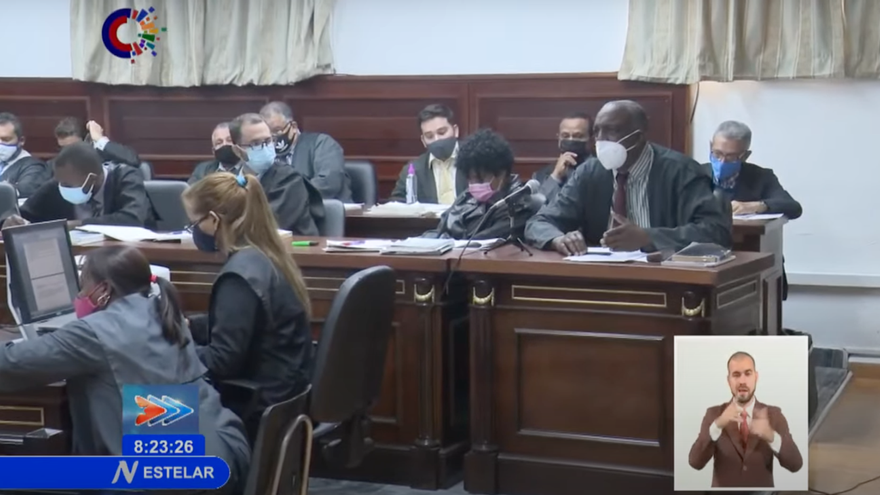
![]() EFE/14ymedio, Havana, 25 May 2022 — A total of 519 of the 564 people who have been tried in Cuba for the anti-government demonstrations last July – 92% – have been sentenced and 40 are still awaiting their sentencing, the NGO Justicia 11J reported on Tuesday.
EFE/14ymedio, Havana, 25 May 2022 — A total of 519 of the 564 people who have been tried in Cuba for the anti-government demonstrations last July – 92% – have been sentenced and 40 are still awaiting their sentencing, the NGO Justicia 11J reported on Tuesday.
According to a statement from the organization, only five of the defendants have been acquitted after the start of the trials, at the end of 2021.
In the event that the 40 people who are still awaiting their resolution are found guilty, the percentage of those sentenced would rise to 99%, according to data from the association.
The NGO also reported that “of all the people tried or awaiting trial, we can say that around 70 to 80% have awaited trial under pretrial detention.” In addition, it criticized that 101 people are still waiting for their legal process to begin.
On the other hand, Justicia 11J increased its record of detainees after the demonstrations from 1,444 in April to 1,470 today, 12 minors of whom are under 18 years of age.
With the data of this same association, it can be asserted that the appeals of the convicted are not serving to modify the sentences either. As of 13 May, 40 people had received a response to the review of their sentence in the first instance, of which only one managed to go from one year in prison to acquittal.
Also in another case, after appealing a sentence of 3 years and 8 months, a prisoner obtained a reduction to 2 years and two months. Most of the remaining cases, at least 32, have kept the sentence intact and some isolated cases have modified the form of imprisonment or reduced the time of internment by one month.
Despite this, organizations defending the rights of prisoners insist that the families continue to resist and not give up a right that could be useful to them, even though the percentage of success is very low.
Relatives of those convicted and organizations have not ceased to criticize the trials, with a total lack of guarantees, fabrication of evidence and high sentences, accusations that the Supreme Court rejects.
However, two weeks ago, Raucel Ocaña Parada, former prosecutor of Palma Soriano, in Santiago de Cuba and now exiled in Europe, awaiting a resolution of his asylum request in Switzerland, said in an interview that the sentences are decided by the party and are imposed on the courts, which are not independent.
The Cuban Attorney General’s Office assured in January that 790 people had been prosecuted for the July 11 protests, of which 55 were between 16 – the minimum criminal age – and 17 years old.
Amnesty International requested to be able to attend the trials, to which the press also does not have access, but it has never been answered in the affirmative. For the upcoming trial of Luis Manuel Otero Alcántara, scheduled for next Monday and Tuesday, the opposition has asked the correspondents to do everything possible to cover it.
The NGO Prisoners Defenders points out that at least 842 people were in prison on the island at the end of 2021 for political reasons, mostly for the events of July 11, although the authorities insist that there are no political prisoners and assure that the legal charges have to do with “acts of vandalism.”
____________
COLLABORATE WITH OUR WORK: The 14ymedio team is committed to practicing serious journalism that reflects Cuba’s reality in all its depth. Thank you for joining us on this long journey. We invite you to continue supporting us by becoming a member of 14ymedio now. Together we can continue transforming journalism in Cuba.
